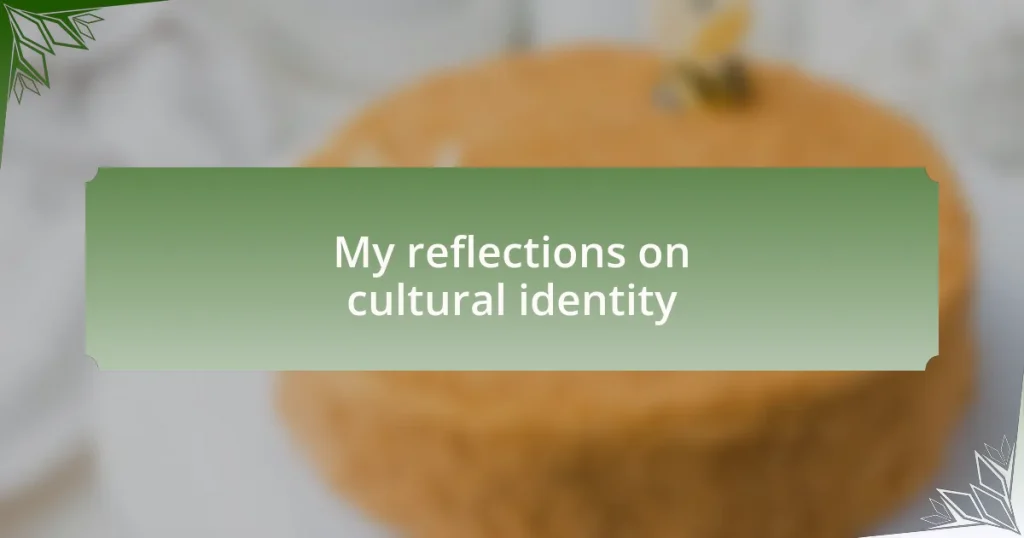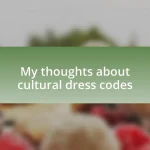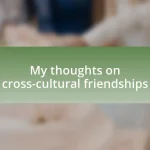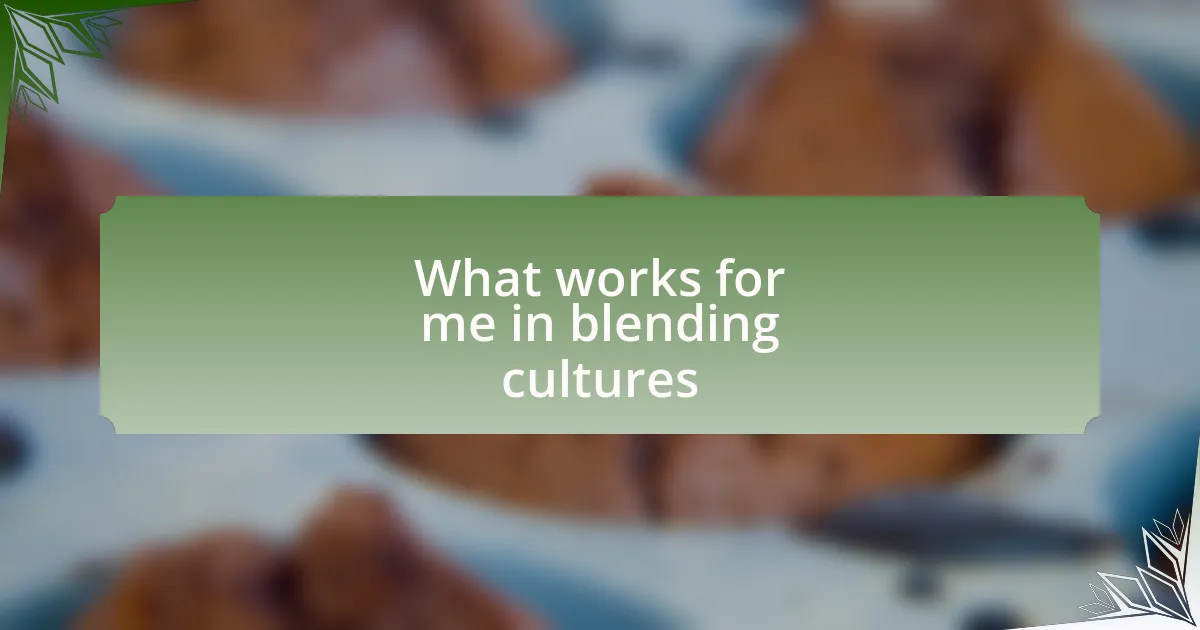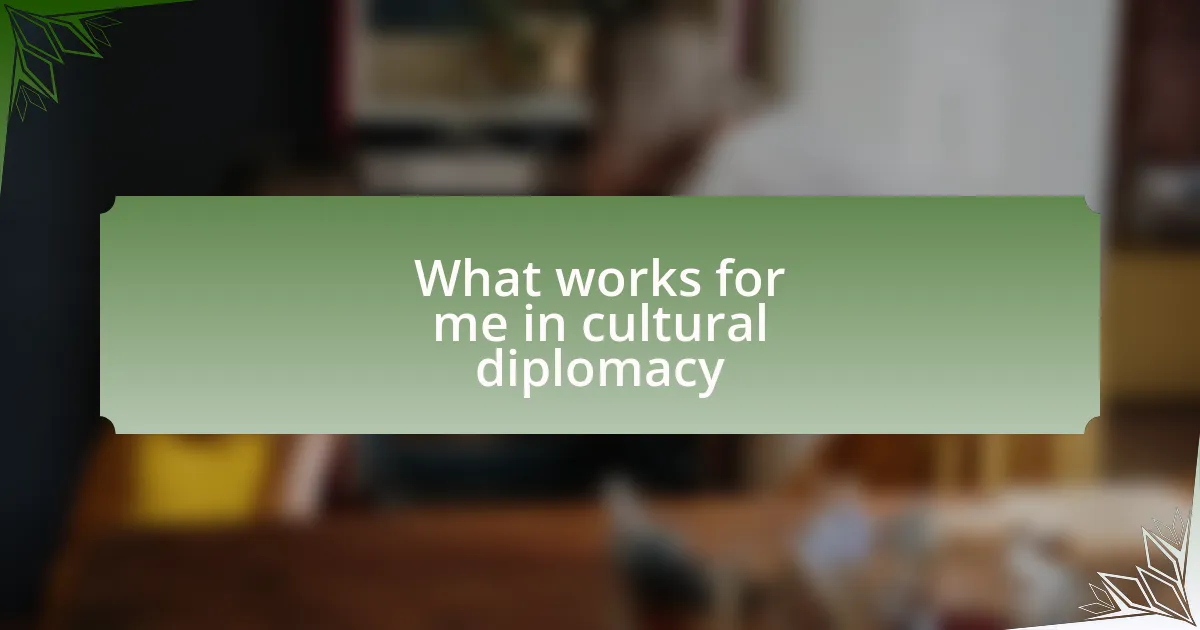Key takeaways:
- Cultural identity is deeply intertwined with traditions, as exemplified by wedding cakes that reflect history, values, and personal stories.
- Wedding cakes symbolize unity and are significant as they often embody the couple’s heritage and serve as a focal point of celebration.
- Different cultures incorporate unique flavors and designs in wedding cakes, turning them into vessels of meaning and connection.
- Sharing a wedding cake can evoke nostalgia and warmth, fostering community bonds through collective memories and familial narratives.
Author: Evelyn Carter
Bio: Evelyn Carter is an award-winning author known for her gripping psychological thrillers and captivating contemporary fiction. With a background in psychology, she skillfully weaves intricate character studies and suspenseful plots, engaging readers from the first page to the last. Her debut novel, “Shadows of the Mind,” was praised for its sharp insights and unexpected twists, earning her a place among the best new voices in literature. When she’s not writing, Evelyn enjoys exploring the great outdoors and volunteering at her local animal shelter. She lives in Portland, Oregon, with her two spirited rescue dogs.
Understanding cultural identity
Cultural identity is a complex tapestry woven from our shared experiences, values, and the traditions passed down through generations. I remember attending a family wedding where the cake not only represented sweetness but also embodied my heritage, sparking a deep sense of belonging within me. Isn’t it fascinating how food, particularly dessert, can act as a bridge to our roots?
When we delve into our cultural identities, we often uncover layers of history that shape our understanding of self. For instance, during my travels, I encountered different wedding cake traditions that reflected the unique customs of various cultures, leaving me in awe of how these desserts tell powerful stories. Have you ever thought about how a simple cake can encapsulate dreams, celebrations, and the essence of who we are?
Ultimately, our cultural identities play a pivotal role in shaping our preferences, from the flavors we love to the traditions we cherish. I recall the joy of learning about the significance of certain cake designs during a friend’s wedding, which highlighted how cultural elements can transform a dessert into a meaningful artifact. This connection has made me appreciate the importance of acknowledging our backgrounds in every slice of life.
Impact of culture on traditions
When I reflect on the impact of culture on traditions, I’m often reminded of my own family’s practices during wedding celebrations. Each cake we’ve had over the years has been adorned with symbols that resonate deeply with our heritage. Have you ever wondered why certain designs or flavors evoke such strong emotional connections? For me, they symbolize not just a celebration, but also stories of love and sacrifice from generations before us.
Different cultures infuse their wedding cake traditions with distinct flavors and designs that offer a glimpse into their values. For instance, I once attended a wedding where the couple incorporated traditional spices into their cake, a nod to their roots. This blend of ingredients was not just about taste; it revealed a rich narrative of their family history. Can you feel the nostalgia when each bite transports you to a different time and place?
As I’ve learned more about these cultural influences, I’ve come to understand that they shape our rituals and expectations. At another wedding, the cake was shaped like a traditional symbol of unity, showcasing how food can serve not only as a delicious treat but also as a centerpiece of cultural significance. It makes me think—how does your cultural background shape your celebration? Each tradition offers a thread in the fabric of our shared experience, making each wedding uniquely meaningful.
Significance of wedding cakes
Wedding cakes hold a profound significance in the context of marriage, going beyond mere dessert. I still recall the moment when I first saw my aunt’s wedding cake—three tiers adorned with delicate flowers that mirrored her bouquet. This wasn’t just a cake; it was a testament to her love story, embodying the dreams and hopes she had for her life ahead. Isn’t it fascinating how something so sweet can carry such weight?
In many cultures, the cutting of the cake symbolizes the first act of unity that the couple shares as partners. During my friend’s wedding, the couple invited their families to join them in this act. As they sliced through the cake together, it felt like a collective celebration, blending families and histories in that single gesture. Doesn’t it make you embrace the idea that cake can bridge generations?
Moreover, the flavors and decorations often tell their own stories, reflecting the couple’s personality or cultural background. I remember a wedding where the couple featured a cake infused with mango and coconut, evoking memories of warm summer days spent on family vacations. Each bite was a dive into nostalgia, a reminder of where they came from. How often do we overlook the emotional layers that bring a simple dessert to life?
Cultural variations in wedding cakes
When I think about cultural variations in wedding cakes, I can’t help but recall a beautiful Italian wedding I attended. The couple opted for a traditional “Torta Setteveli,” which is a stunning combination of dark chocolate and hazelnuts. It was mesmerizing to witness how this cake represented not just their heritage, but also their commitment to sharing those flavors with their guests. It raised a question in my mind: how often do we see a cake as a centerpiece of cultural storytelling?
In contrast, at a friend’s Vietnamese wedding, we celebrated with a “bánh cưới,” which is a square, intricately designed cake made with glutinous rice flour. The couple explained that the square shape represents their home and the foundation of their marriage. I could feel the deep connection to tradition as they shared slices with their families, blending the sweet flavors of the cake with heartfelt messages of prosperity and happiness. Isn’t it intriguing how every culture transforms a wedding cake into a vessel for meaning and connection?
Reflecting on the diverse styles, I now understand that every wedding cake tells a story rooted in cultural identity. I once encountered a couple who designed a cake inspired by the vibrant spices of their Indian heritage, adorned with edible flowers that represented their love. As we enjoyed each bite, the flavors of cardamom and saffron transported us across continents. Does it not make you appreciate how a wedding cake can weave together narratives and shared experiences from generations past?
Personal reflections on wedding cakes
There’s something profoundly intimate about sharing a wedding cake that reflects one’s family history. I remember attending a wedding where the couple chose a simple yet elegant vanilla sponge layered with fresh strawberries, a nod to their parents’ humble beginnings. As they sliced into the cake, I felt a sense of warmth in the room, a shared acknowledgment of where they came from and the flavors that shaped their lives.
I can’t help but smile when I think of a friend’s wedding, where they decided to serve a rainbow cake infused with memories from each family member’s favorite flavors. The burst of colors was matched by the laughter and stories exchanged as we tasted each layer, symbolizing the blending of cultures and traditions. Isn’t it amazing how a slice of cake can encapsulate the essence of different backgrounds and forge a new family narrative?
Then there was a destination wedding I attended in Mexico, featuring a stunning tres leches cake that practically melted in your mouth. The couple explained that this cake was a celebration of their roots, and as we indulged, I felt a tangible sense of community among the guests—all of us bonding over sweet memories tied to that recipe. How remarkable it is that such a simple dessert can connect us so deeply, serving as a centerpiece of shared joy and love?
Incorporating cultural elements in cakes
Incorporating cultural elements into wedding cakes often transforms them into more than just desserts; they become vibrant storytellers. I once attended a celebration featuring a traditional Irish fruitcake adorned with symbols of Celtic knots. As the couple shared the cake, it sparked conversations about heritage and family stories, showcasing how each bite was steeped in meaning and history.
One wedding I remember fondly included a beautiful Persian wedding cake, known as “Khafta.” The intricate layers and unique flavors reflected the couple’s rich cultural background. I felt an instant connection with the diverse group of guests as we relished the unique spice combinations, each bite whispering secrets of the past while celebrating a beautiful future together.
Have you ever noticed how certain ingredients can evoke nostalgia? A couple I know integrated spices from their Indian heritage, creating a chai-infused cake that mingled perfectly with traditional wedding flavors. Guests were equally delighted and surprised, illustrating how culinary choices can highlight one’s identity and create memorable experiences that honor family legacies.
